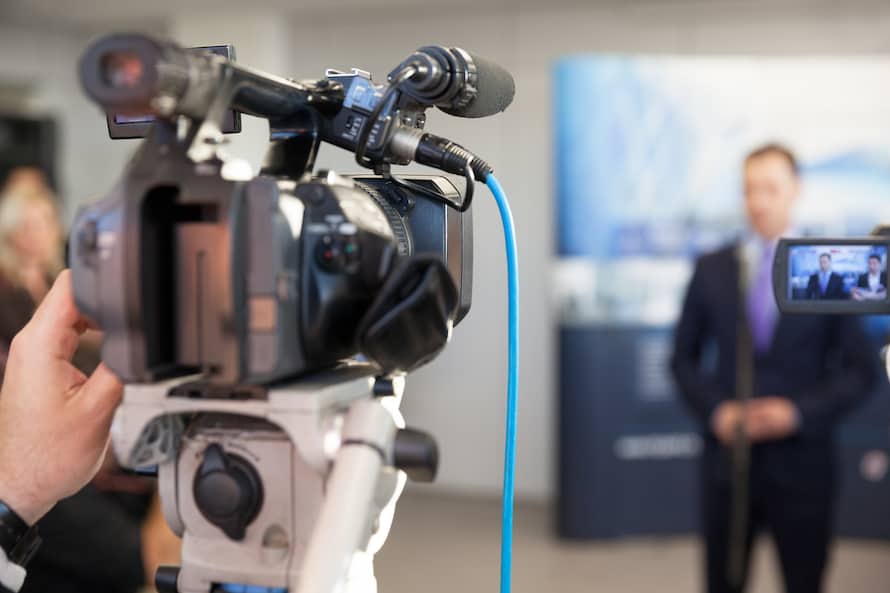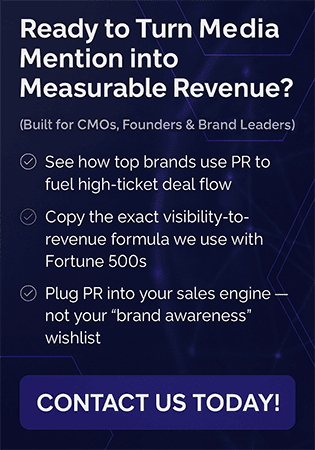Plenty of PR agencies can get their clients press, and good press too.
But without even realizing it, your brand may be getting a lot less from your PR agency than it should be.
In this post, we’ll cover the critical point at which most PR agencies are failing their clients, and what you can do to make sure you’re getting the absolute most for your PR budget.
Here we go!
The different stages of B2B PR
For most agencies, the B2B PR campaign process generally falls into three stages:
- Discovery
- Pitching
- Press
The thing is, there’s a missing fourth stage that can massively improve your ROI and overall brand recognition and awareness. More on that in a moment.
Here’s what happens in each stage of the PR process.
Stage 1: Discovery
This is when your PR agency, or the media specialist who’s on your account, is getting to know your brand.
They’ll research your company and your executives, look at your existing social media and online presence, and look for any existing press about your brand. After that, they’ll likely ask you some questions on a discovery call (at Zen, we call these “Getting to Know You” calls).
The point of this research phase is to get a good idea of your brand’s personality—tone, voice, etc.—as well as which topics or publications your brand would be a good fit for. It’s also helpful to know what kinds of issues, industry trends, and topics your founders or executives are well-suited to speak about. This will help especially when it comes to quick opportunities for quotes or comments—things like HARO inquiries, or trend roundups.
Finally, the PR team will craft broad storylines to base their pitches around.
Stage 2: Pitching
In the pitching stage, your media specialist is reaching out to the reporters, bloggers, creators, and others with whom they have a relationship. They’ll send the pitches they’ve already crafted, while also keeping an eye out for other opportunities that might fit your brand.
This process is ongoing, so it won’t stop once you get press (unless your contract is over, that is). The media specialist will continue looking for good opportunities and sending out additional pitches as it makes sense.
The exception to this would be if you’ve engaged the PR agency for a specific campaign, like a product launch or a conference. In this case, the pitching stage will be time-sensitive and tied to that event, with the media specialist focusing all their time on getting as much attention as possible during that campaign.
Stage 3: Press

At this point, press is coming in and you’re getting the coverage your PR agency has worked hard to attract.
Your leadership team may be doing interviews with reporters. Your communications team may be crafting comments to submit to blogs. And you may receive requests for 1-3 sentence quotes for various media opportunities.
This stage may coincide with the pitching stage if you receive press attention early on.
The fourth stage that most PR agencies miss out on: Amplification
For most PR agencies, the press stage is where they stop. They get your brand the press hits, and after that, it’s up to you to keep the ball rolling.
To be fair, this is how traditional PR has always worked.
But it’s certainly not the ideal scenario.
At Zen, we place a lot of emphasis on the final, “missing” stage that other PR agencies ignore: amplification.
What is amplification, in PR terms?
Amplification means that when your brand gets a press hit, we amplify it by sharing, repurposing, and turning it into more press. In other words, instead of getting the press hit and filing it away in a spreadsheet, we also:
- Create ads
- Develop owned content referencing or inspired by the press hit
- Share and promote it on social media
- Use the press to attract influencers
- Use the press to further additional PR attention through social audio, events and conferences, etc.
- And additional opportunities that make sense for your brand.
Why does amplification matter?
The reason we place so much emphasis on amplification is that it can give you a much higher ROI, overall, than simple PR efforts alone.
Press hits can be a huge boost to your brand awareness, on their own, especially if they’re first-tier—there’s no doubt about that.
However, if you’re not amplifying that press once you get it, you’re missing out on an opportunity to get much, much more out of it. And we’re not just talking about the obligatory sharing on social media.
We mean writing a blog post that references the press hit and links back to it.
Mentioning the press on a podcast that you’re a guest on.
Creating a poll or interactive social media post for your followers inspired by your recent coverage.
The list goes on.
If you invest in the amplification stage, you’ll see that not only does your brand awareness continue to increase, but it also gets easier to get more and more press—you’ll keep that momentum going.
In addition, amplifying your press coverage can make it easier to negotiate deals with B2B influencers. It can also generate new, original content to base your ads and social media posts around.
If your B2B PR agency isn’t amplifying the press you receive, you may want to ask them why they’re neglecting such a major opportunity. To talk to Zen about our B2B PR process, get in touch!
Consider how much content exists online today. It’s in blogs, magazines, trade publications, social media. Even if you narrow it down to just how much content exists that covers your industry, you can see that even a feature in the Wall Street Journal





